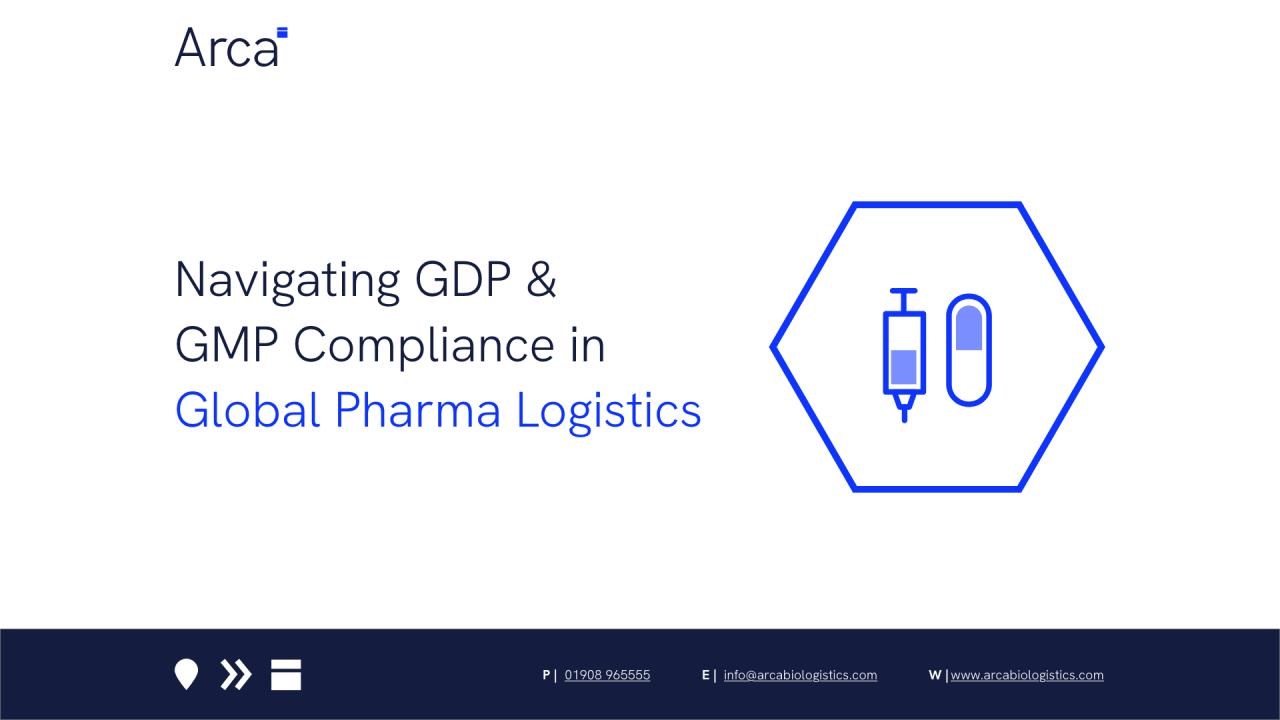Navigating GDP & GMP Compliance in Global Pharma Logistics
Pharmaceutical companies operate in one of the most highly regulated industries in the world. From the earliest stages of research and development to the delivery of finished medicines, compliance is non-negotiable. In global pharmaceutical logistics, adherence to Good Distribution Practice (GDP) and Good Manufacturing Practice (GMP) is not just a legal requirement; it is fundamental to safeguarding patient safety, product quality, and brand reputation.
For organisations managing complex supply chains across borders, navigating GDP and GMP compliance is often daunting. However, with the right partner and systems in place, it can become a source of competitive advantage. At Arca BioLogistics, we help pharmaceutical companies achieve peace of mind by embedding sustainability, reliability, and efficiency into every shipment.
This article explores the critical role of GDP and GMP compliance in global pharma logistics, the challenges companies face, and how advanced solutions are helping organisations meet and exceed regulatory expectations.
Understanding GDP & GMP Compliance
Before diving into logistics challenges, it is worth revisiting what GDP and GMP actually mean for pharmaceutical companies.
Good Distribution Practice (GDP) ensures that medicines are consistently stored, transported, and handled under suitable conditions as required by the product specifications. This includes maintaining correct temperature ranges, safeguarding against contamination, and ensuring full traceability throughout the supply chain.
Good Manufacturing Practice (GMP) covers the broader framework of quality assurance in manufacturing, requiring products to be produced consistently and controlled to quality standards appropriate for their intended use. In logistics, this means ensuring that the integrity of the product is preserved from the moment it leaves the manufacturing site.
Together, GDP and GMP form the backbone of pharmaceutical quality systems. Logistics providers must not only comply with these frameworks but also support pharmaceutical clients in demonstrating compliance through auditable data and reliable performance.
The Global Pharma Logistics Landscape
Pharmaceutical logistics is uniquely complex. Unlike many industries where late or damaged deliveries primarily cause financial loss, failures in pharma logistics can have direct consequences for patient health and safety. Add to this the global nature of supply chains, and the importance of robust compliance becomes clear.
Key characteristics of today’s pharmaceutical logistics include:
Temperature Sensitivity: Many medicines, vaccines, and biologics require strict cold chain management across frozen, refrigerated, and ambient ranges.
International Regulations: Shipments cross multiple borders, each with their own customs, compliance, and reporting requirements.
High Value of Shipments: Pharmaceuticals are among the most valuable commodities transported globally, making them a target for theft or diversion.
Traceability Requirements: Regulators and customers expect end-to-end visibility of shipments, including environmental data.
These factors make pharmaceutical logistics an area where GDP and GMP compliance must be embedded into every process.
Challenges in Maintaining GDP & GMP Compliance
Despite the best intentions, pharmaceutical companies and their logistics partners face a range of challenges:
1. Temperature Excursions
Even short deviations from required temperature ranges can compromise product quality. Preventing excursions requires not just advanced packaging, but also monitoring, redundancy, and rapid response protocols.
2. Customs and Border Delays
Shipments often face delays at international borders, exposing them to risks of temperature excursions and increasing transit times. Without proactive planning and documentation, compliance can be jeopardised.
3. Inconsistent Performance
Variability in transit performance – including booking times, customs clearance, and delivery schedules – makes it difficult for pharmaceutical companies to plan effectively. This inconsistency can lead to wasted time, resources, and products.
4. Lack of Transparency
Without real-time visibility of shipments, companies may not identify compliance issues until it is too late. Traditional logistics providers often fall short in providing the transparency that regulators and auditors now demand.
5. Administrative Burdens
For many pharmaceutical staff, managing logistics is not their core role. Time spent managing shipping, filling in customs forms, and chasing updates is time taken away from high-value work.
Arca BioLogistics: Embedding Compliance Through Innovation
At Arca BioLogistics, we recognise that pharmaceutical companies need more than just transport – they need a partner who can navigate GDP and GMP compliance while adding value in sustainability, reliability, and efficiency. Here’s how our approach addresses the challenges above:
1. Sustainability in Pharma Logistics
Reusable Packaging and Loggers: Our packaging solutions can be used across multiple shipments and temperature ranges, cutting down on single-use waste.
Carbon Offset Options: Clients can offset the carbon emissions of every shipment, supporting their net-zero commitments.
Minimising Spoilage: With advanced monitoring and reliable packaging, fewer products are compromised, reducing both financial and environmental waste.
Looking to align your logistics with your sustainability goals? Speak to our team about reusable packaging and carbon offsetting.
2. Reliability for Peace of Mind
Arca Live Portal: Our technology gives clients real-time visibility of location, temperature, and performance data, ensuring transparency at every stage.
Consistent Transit Performance: From booking to customs clearance, we deliver predictability, enabling clients to plan their supply chains with confidence.
Validated Routes: By using optimised, validated routes, we reduce the risks of delay and deviation, ensuring compliance across domestic and international transport.
Reliability is not just about avoiding problems – it’s about creating an environment where pharmaceutical companies can manage their resources effectively, minimise waste, and focus on what matters: delivering life-saving medicines.
3. Time and Efficiency for Pharma Teams
Reduced Pre-Shipping Time: By combining our Arca Live portal with expert support, we deliver an average reduction of 84% in the pre-shipping process compared with traditional providers.
Single Point of Contact: Clients no longer need to juggle multiple vendors; Arca manages the complexity, freeing teams to focus on higher-value activities.
Streamlined Processes: Automated workflows, expert documentation support, and proactive communication remove unnecessary bottlenecks.
Free your team from logistical burdens. Let Arca BioLogistics handle the complexity so you can focus on innovation.
GDP & GMP in Practice: Building a Culture of Compliance
GDP and GMP compliance is not simply a set of regulations to follow – it is a culture that must permeate every aspect of logistics operations. At Arca, we help pharmaceutical companies build that culture by:
Training and Expertise: Ensuring that staff handling products are fully trained in compliance requirements.
Auditable Data: Providing full records of shipment performance for audits and inspections.
Risk Management: Proactively identifying and addressing potential risks before they affect compliance.
Partnership Approach: Working closely with clients to align logistics strategies with broader compliance and quality frameworks.
The Future of GDP & GMP Compliance in Global Logistics
As the pharmaceutical sector continues to globalise and innovate, the role of logistics will only become more central. Key trends shaping the future of GDP and GMP compliance include:
Digital Transformation: Real-time monitoring, predictive analytics, and AI-driven insights will redefine supply chain transparency.
Sustainability Demands: Regulators and consumers alike are increasing pressure for carbon-neutral logistics.
Global Collaboration: Academic institutions, pharmaceutical companies, and logistics partners will continue to collaborate more closely to share resources and best practices.
Resilience Building: Post-pandemic, companies are prioritising supply chain resilience to withstand disruptions.
Pharmaceutical companies that embrace these trends, while maintaining a laser focus on compliance, will be better positioned to deliver value to patients and shareholders alike.
Turning Compliance into Competitive Advantage
Navigating GDP and GMP compliance in global pharma logistics is undeniably complex. Yet with the right partner, it can become a competitive advantage rather than a burden. By embedding sustainability, reliability, and efficiency into every shipment, Arca BioLogistics empowers pharmaceutical companies to:
Reduce waste and carbon emissions.
Gain peace of mind through transparency and consistency.
Save time and free their teams to focus on science and innovation.
Compliance is not just about ticking boxes – it’s about protecting patients, preserving trust, and enabling progress.

